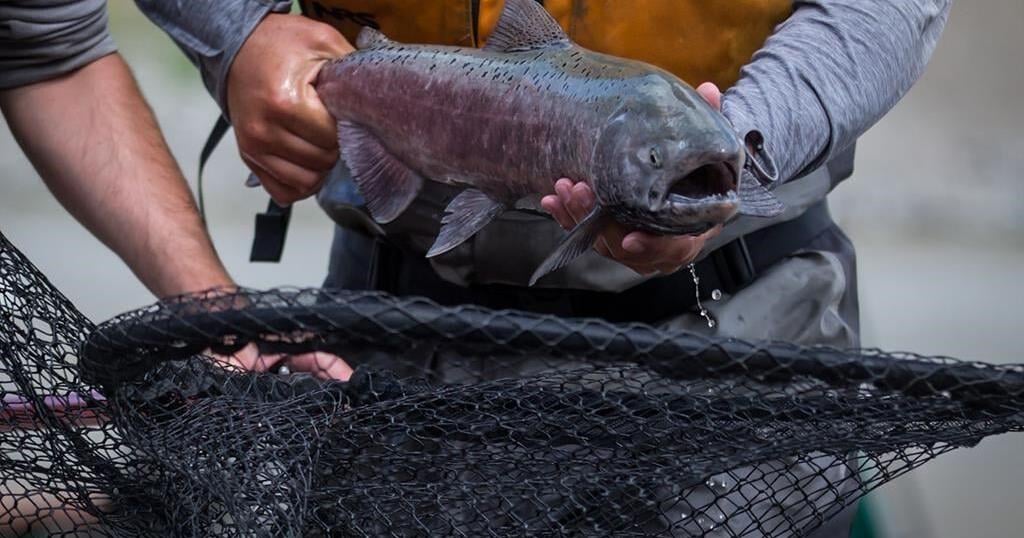KAMLOOPS, B.C. – Low water levels brought on by years of severe drought, paired with meagre snowpack and rainfall, are leaving B.C.’s salmon in a compromising position during their spawning migration, a fisheries expert warns.
Researchers are also trying to understand the effects of last year’s devastating wildfires in B.C.
Salmon need a steady stream of cool, fresh water to survive and reach their spawning grounds, but Murray Manson, the section head of the Fisheries Department’s Habitat Restoration Centre of Expertise, told a briefing Friday that he is expecting fish to start appearing in some low-water areas.
“We’re trying to be prepared for some of the issues that might arise,” he said.
Concerns persist despitea cool spring that left B.C. in a more “fortunate” position than expected, Manson noted.
“We’ve gotten off easy so far, I would say, in terms of the drought and its impacts on fish,” he said.
Some regions, like the Fraser River basin, that were predicted to see historically low salmon runs are currently in a state of “wait and see,” Manson said.
“They’re still swimming into the drought conditions which exist upstream,” he said of the salmon. “(But) it’s early. Things are still developing.”
The department said in a statement that drought and heat can have a range of negative effects that are likely to hit salmon survival in B.C. this year.
It said low water levels can block salmon from spawning areas and expose them to predators while hot water can harm fish health, reducing spawning ability and make salmon vulnerable to illness.
In the Kamloops region, the Fisheries Department said the habitat restoration centre, which works closely with First Nations, stewardship groups, academics and salmon advocates, is aiming to mitigate effects of drought on its salmon runs.
For example, on the Deadman River, its salmon restoration team is working to restore black cottonwood riverbank zones “so that these ecosystems might once again regulate water temperatures and provide cool refugia for fish.”
On the Adams River, which the department said is home to one of the largest sockeye salmon runs on the continent, researchers are assessing how the 2023 Bush Creek East Wildfire affected the river and its vegetation.
“Our salmon habitat restoration team is pairing historical imagery and maps with real-time, high-resolution field data collection to understand how and where the post-fire conditions are affecting fish habitat, including the impacts on spawning conditions for salmon,” the department said in a news release.
Manson said they are working on dozens of restoration projects and testing them to see what works, hoping to apply them more broadly across the landscape.
He said that while each project could be considered a drop in the bucket, developing techniques that can eventually be used widely can “actually make a difference.”
In the meantime, the Fisheries Department is asking people to avoid entering dry streams as they may disrupt “sensitive features.”
Manson said people should act as if those streams are “still productive” fish habitats to ensure vegetation is not disturbed.
People are also asked to manage water use, particularly during drought periods.
Lastly, Manson said the department is instructing people not to move any fish they may find stranded due to low water levels, or any fish that may be caught below a dry section of a stream. Instead, they want people to inform the Fisheries Department via its report line.
“There may be people that are already aware of the situation that are there trying to take action,” he said of fisheries staff. “We might be able to, in some cases, move adult fish, but we would have the proper equipment to do it without causing them more harm.”
About 40 per cent of B.C. is experiencing drought conditions where economic or environmental impacts are likely or almost certain, with such outcomes possible in a further 21 per cent of the province.
— By Brieanna Charlebois in Vancouver
This report by The Canadian Press was first published Aug. 17, 2024.
